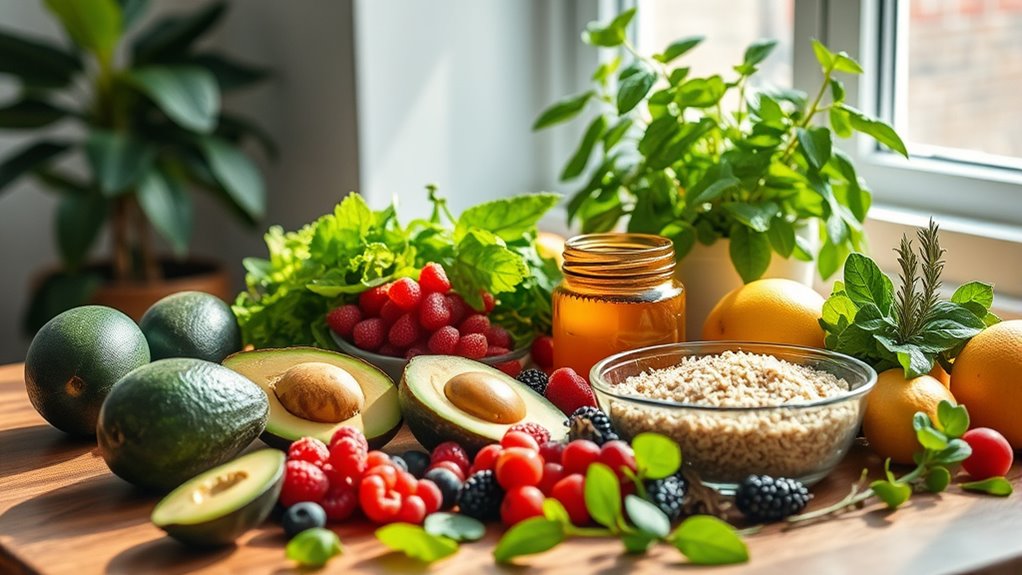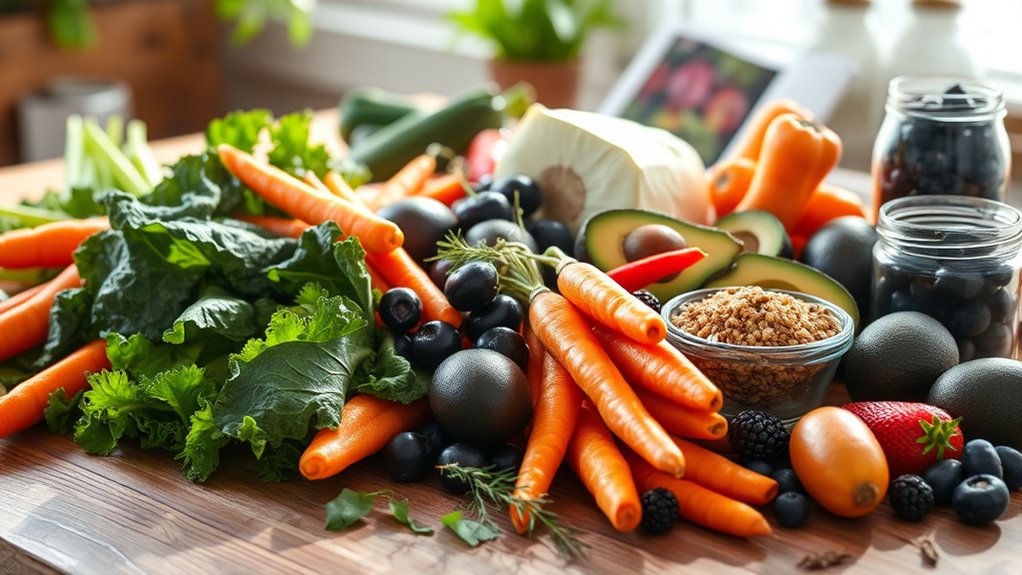Fertility diet trends for 2025 stress balanced nutrition, urging you to focus on whole foods, fruits, and vegetables. It’s important to incorporate healthy fats from sources like avocados and nuts, and include plant-based proteins such as legumes. High-fiber foods can support digestive health, while fermented options boost gut health. Prioritizing these elements can enhance your reproductive health and fertility. There’s so much more to explore about optimizing your fertility through diet.
Key Takeaways
- Emphasis on whole foods, including fruits, vegetables, and whole grains, will dominate fertility diets in 2025 for improved reproductive health.
- Plant-based protein sources like legumes and nuts will gain popularity for their health benefits and support for fertility optimization.
- Healthy fats from avocados and nuts will be prioritized to enhance hormone production and overall reproductive health.
- Increased focus on fiber-rich foods will support digestive health and weight management, crucial for fertility in 2025.
- Fermented foods will be essential for gut health, reducing inflammation, and enhancing reproductive functioning through probiotics.

As you explore fertility diet trends, you’ll find that balanced nutrition plays a crucial role in enhancing reproductive health. Focusing on whole foods, fruits, vegetables, and whole grains can optimize your body’s ability to conceive. When it comes to protein sources, incorporating plant-based options like legumes and nuts can be particularly beneficial for fertility. These foods not only provide essential nutrients but also promote overall health.
Healthy fats shouldn’t be overlooked either. Including sources like avocados and nuts in your diet ensures you get necessary fatty acids, which support hormone production and overall fertility. Staying hydrated is essential, too. Drinking enough water supports all bodily functions, including reproductive health. Instead of jumping on fad diets, prioritize a balanced eating plan that nurtures your body and enhances your fertility potential.
Incorporate healthy fats and stay hydrated to support hormone production and enhance your fertility potential.
When you think about plant-based foods, consider adding legumes such as beans, lentils, and peas to your meals. They’re rich in fiber and vital nutrients, making them excellent for your reproductive system. Leafy greens also deserve a spot on your plate; they offer a wealth of vitamins and minerals that contribute to overall health.
Fruits and vegetables are high in antioxidants and fiber, both crucial for promoting fertility. Don’t forget about nuts and seeds—almonds, chia seeds, and flaxseeds provide healthy fats and fiber that can aid in your fertility journey. Whole grains like quinoa, oats, and brown rice serve as great sources of complex carbohydrates, giving you sustained energy.
Fiber plays an important role in your diet, too. It supports digestive health, which is linked to fertility. Foods rich in soluble fiber help manage cholesterol levels and promote a feeling of fullness, which can assist in weight management. To reap these benefits, try to incorporate chia seeds, flaxseeds, and whole grains into your meals regularly. Fiber-rich foods help prevent or relieve constipation and promote digestive health, further supporting your reproductive system.
Fermented foods are another vital component for enhancing fertility. They’re packed with probiotics that support gut health, which is crucial for reproductive functioning. Foods like yogurt, kimchi, and sauerkraut can provide essential vitamins and minerals while potentially reducing inflammation and supporting your immune system.
Adding these foods to your diet not only boosts nutritional value but also contributes to a healthy gut. Incorporating these fertility diet trends can help you on your journey toward reproductive health. Emphasizing balanced nutrition, focusing on whole foods, and ensuring hydration can create a solid foundation for enhancing your fertility.
Frequently Asked Questions
How Do Genetics Influence Fertility and Diet Choices?
Genetics significantly influences your fertility and diet choices. Specific genetic variants can affect your hormone levels and reproductive success.
These variations also shape your food preferences, guiding what you crave and how your body processes nutrients. For instance, some genes may predispose you to prefer certain fats or proteins, impacting your overall diet.
Understanding these genetic influences allows you to tailor your nutritional choices, potentially enhancing your fertility and overall health.
Are There Specific Supplements to Enhance Fertility?
When it comes to enhancing fertility, the right supplements can feel like a magic potion.
You’ll want to consider folic acid for neural health and vitamin D for overall reproductive wellness. Omega-3 fatty acids from fish oil can boost your chances of conception, while Coenzyme Q10 might improve egg quality.
Don’t forget prenatal multivitamins—they’re packed with essential nutrients that support both fertility and pregnancy.
Prioritize these supplements for a healthier reproductive journey!
Can Stress Management Impact Fertility Success Rates?
Yes, managing stress can significantly impact your fertility success rates. High stress levels disrupt hormone balance, affecting ovulation and sperm quality.
Incorporating techniques like mindfulness, regular exercise, and relaxation methods can lower cortisol levels, promoting reproductive health.
Additionally, maintaining a supportive environment and seeking professional help for emotional challenges can enhance your overall well-being, ultimately improving your chances of conception.
Prioritizing stress management is essential on your fertility journey.
What Role Does Exercise Play in Fertility?
Exercise enhances your energy and elevates your chances of fertility. By engaging in moderate physical activity, you regulate hormones and reduce stress, fostering a healthier reproductive environment.
Regular workouts improve menstrual cycles and support ovulation, while also increasing blood flow to vital areas.
However, remember to balance your routine; too much intense exercise can negatively impact fertility. Aim for at least 30 minutes daily to effectively support your reproductive health.
Are There Any Foods to Avoid While Trying to Conceive?
When you’re trying to conceive, it’s crucial to avoid certain foods that can hinder fertility.
Steer clear of added sugars, high caffeine, red and processed meats, unhealthy fats, and excessive alcohol. These can disrupt hormone balance and reduce sperm quality.
Instead, focus on a balanced diet rich in whole foods, omega-3 fatty acids, and antioxidants to support your reproductive health.
Making these dietary changes can significantly enhance your chances of conception.
Conclusion
As you navigate the evolving landscape of fertility diets in 2025, remember that every bite you take can be a step toward your dreams. Just like the mythical Persephone, who journeyed between worlds, you can blend ancient wisdom with modern science to nurture your body and spirit. By embracing these trends, you’re not just feeding your body; you’re cultivating hope for the future. So, savor each meal and let it be a part of your unique fertility journey.









